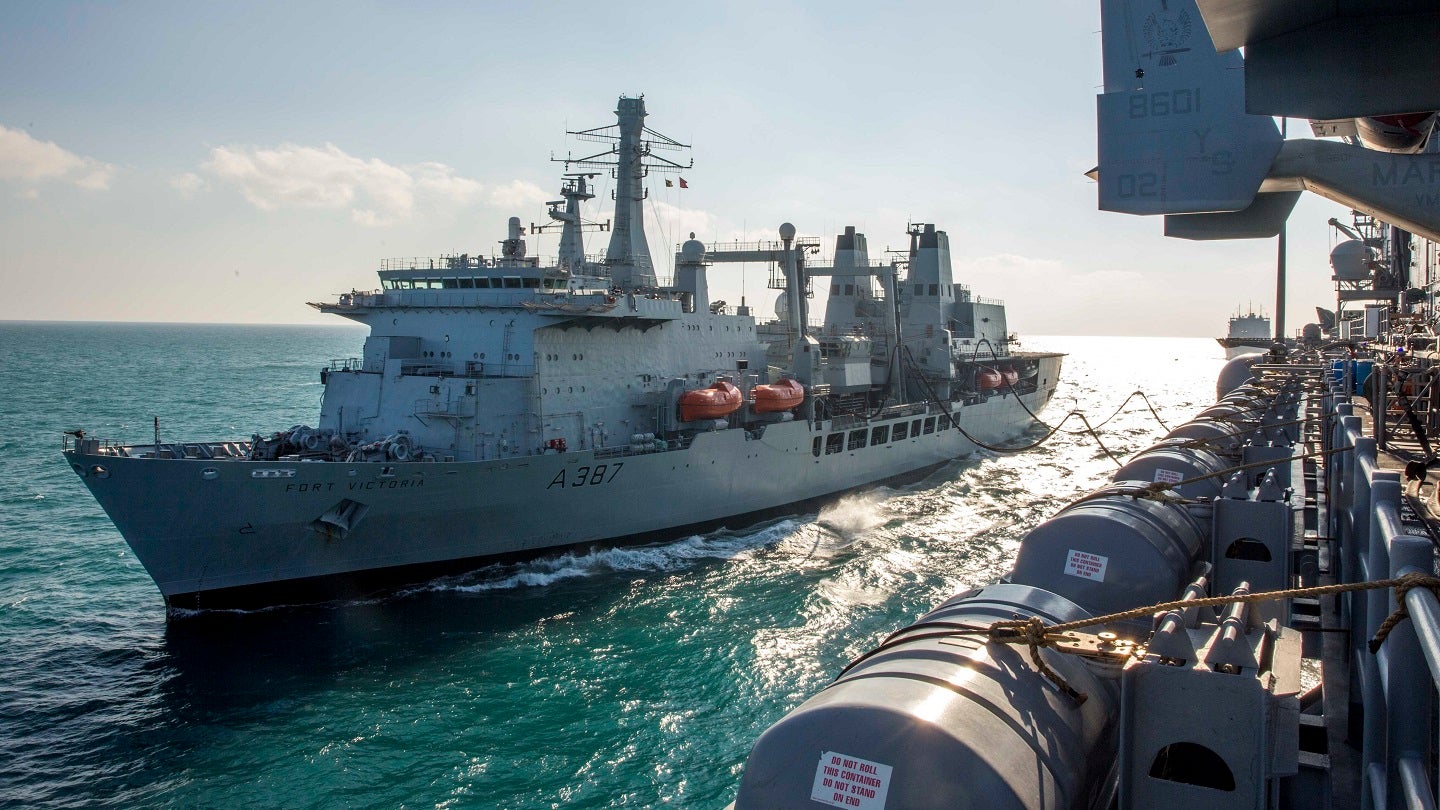
The UK Ministry of Defence (MoD) has seemingly broken from standard practice regarding operational naval deployments to confirm that the Royal Fleet Auxiliary’s (RFA) sole remaining solid support vessel, RFA Fort Victoria, will not participate in Exercise Steadfast Defender this year.
Rather, the vessel has been described as “currently in port ready to commence a planned maintenance period”, according to James Cartlidge, Minister for Defence Procurement at the MoD.
“While we do not disclose the fine detail of forward availability forecasts to preserve the operational security of the fleet, I can exceptionally confirm that RFA Fort Victoria was never tasked to participate in Exercise Steadfast Defender 2024,” Cartlidge stated.
The UK MoD will normally decline to comment on upcoming deployments due to operational security reasons but has deemed it necessary to do so in this instance.
The planned maintenance period comes on the back of an extensive £18m ($22.9m) refit of RFA Fort Victoria in 2022. Since the refit, additional work has been undertaken on the vessel by Cammell Laird shipyard in Birkenhead costing approximately £2.3m, according to official figures.
As of July 2023, the planned out-of-service date (OSD) for RFA Fort Victoria is 2028. This timeframe creates a minimum three-year capability gap between the current vessel leaving service and the introduction of the first of an eventual three-ship class of new solid support vessels, under the Fleet Solid Support (FSS) ship programme.
From the start of manufacture of the FSS programme in 2025 it will take six years before the first of the ships will enter service, at some point in 2031.
No solid support – what’s the problem?
Solid support vessels form a key logistics element to the sustaining of a deployed carrier strike group (CSG), which usually incorporates a number of surface combatants (frigates and destroyers) and an aircraft carrier. Support ships provide the stores, ammunition, and fuel required in order to sustain a floating airfield at sea for an extended period of time.
The RFA Fort Victoria is the UK’s only solid support ship and was part of the UK Royal Navy’s CSG21 deployment to the Asia Pacific in 2021, which tested the operational capabilities of the new Queen Elizabeth-class aircraft carriers.
The UK has recently confirmed that it will be sending another CSG to the Asia-Pacific region in 2025, which could be the final long-range deployment of RFA Fort Victoria before its current planned OSD. Given the four-year gap between CSG21 and the upcoming CSG25, RFA Fort Victoria will have to undergo recertification should the vessel be retained beyond 2028 to the potential future CSG mission in 2029.
With Fort Victoria in maintenance, the deployment of a Queen Elizabeth-class aircraft carrier to Nato’s Exercise Steadfast Defender, due to take place between February and May this year, will be performed without a solid support vessel. Given the likely operational area of Steadfast Defender, the proximity to friendly ports means the Queen Elizabeth-class carrier deployed will not require such support.
The lack of a UK carrier in the Red Sea or Middle East region as the Houthi movement in Yemen, backed by Iran, continues to attack merchant shipping transiting the Bab el Mandeb straight, has been noted by observers. Instead, the UK has participated in US-led strikes on Houthi military targets in Yemen, most recently on 22 January, using Typhoon fighter based in Cyprus, thousands of kilometres distant.
The ability for the UK to have a similar capability as a US Navy aircraft carrier, a ‘slot into’ gaps created by US carrier deployment, was a prime driver in the development of the Queen Elizabeth class, which have not undertaken any combat missions from their flight decks since entering service in 2017.
Fort Victoria replacement – the FSS
In January 2023 the UK MoD awarded a £1.6bn contract to Team Resolute, comprised of UK ship designers BMT, UK shipyard Harland & Wolff (Belfast and Appledore), with Navantia UK, an arm of Spanish shipbuilder Navantia, acting as prime, to deliver three FSS ships to the RFA by 2032.
The FSS programme will return major naval shipbuilding back to Northern Ireland and Devon, England, with around £77m from the total contract amount being invested for infrastructure upliftment at Harland & Wolff’s shipyards in Belfast and Appledore (Devon) in the UK.
However, fully one-third of each vessel will be manufactured outside of the UK. Each of the FSS vessels will be assembled from 21 blocks, 14 of which comprise the mid and forward sections to be built by Harland & Wolff in the UK, while seven aft blocks will be built by Navantia in Cadiz before being transported to the UK for final outfitting and integration.



